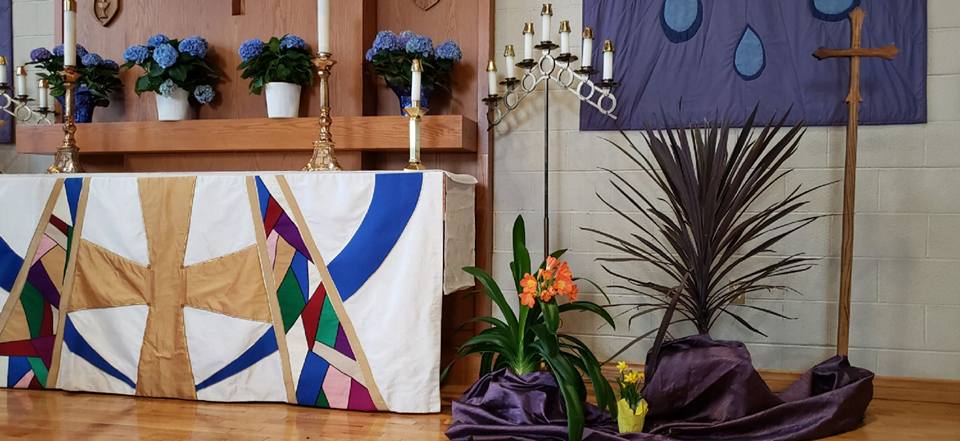Sunday, January 31, 2021:
Deuteronomy 18:15-20;
1 Corinthians 8:1-13
Mark 1:21-28
Prophets. Idols. And Demons. The immediate applicability of these passages might, at first, seem hard to pin down. But then I think about how a mentor of mine who spent a number of years living in Africa, how he mentioned to me about how some farmers had come to use what were basically idols as scarecrows in their fields. Could a Christian use an idol for this purpose? Some said, ‘of course, they’re just scarecrows.’ Others, though, were really troubled by seemingly participating in an animistic lifestyle that they had previously moved away from. So some of these questions really do meet us in our own day. And I haven’t even broached those contemporary idols that really do have sway in our time: of the market, the corporate ladder, sex, our online avatars and the popularity thereof, and so on.
We have what might feel like a strange scene set in the synagogue, where Jesus is confronted by a person with an unclean spirit… When you think of it, every time we pray the Lord’s Prayer, we ask “deliver us from evil.” A concluding collect in our Book of Common Prayer’s end-of-day compline liturgy asks that God would “visit… this place, and drive from it all the snares of the enemy.” In home blessings
that I’ve offered fairly recently I’ve prayed that “the mighty power of the Holy God be present in [that] place to banish from it every unclean spirit, to cleanse it from every residue of evil.” And in our baptism service we ask the candidates “Do you renounce Satan and all the spiritual forces of wickedness… [and] the evil powers of this world which corrupt and destroy the creatures of God?”
In all of these readings there’s an underlying question: where do our choices come from? And where are our actions taking us? A place of order, or a place of chaos? If there’s one thing we remember from Deuteronomy, it’s probably a line from toward the end of the book: “See, I have set before you today life and prosperity, death and adversity…. Choose life so that you and your descendants may live…”
And each of these readings today are set, in some way, in the context of a new beginning: the potential — and the precariousness — of a community at its inception. The Hebrew people about to enter the Promised Land; the Corinthian church, early followers of Jesus struggling to balance freedom with responsibility; and there’s the beginnings of the Jesus movement, soon after the Temptation, and then the calling of the first few disciples, with Jesus making his first public teaching and intervention. And this Jesus, in the synagogue (a place serving as a cultural centre — the heart of the community), is faced with the chaos of disruption and disorder. Where without spells or fanfare he addresses the source of chaos, and restores order. And if you think of twelve step groups or really any authentic handling of a difficult personal or interpersonal situation, the first step is to honestly assess and name the problem. And after that recognition a new beginning is possible.
St. Paul, in this seemingly alien situation of dealing with idolatry woven into the fabric of society, honestly assesses and names the underlying issue just below the surface of the presenting issue of meat sacrificed to other gods. And he thinks through the issue as a follower of Jesus — he thinks theologically — and comes to the understanding that in a situation where one is truly confident in the sovereignty of God — that God really is in control — and the freedom that we have in following Jesus — that the issue here for us to figure out is ‘how might we live together constructively?’ How often in our world today — in which people are seriously struggling to coexist — how often do we get mired and tripped up in sound bytes, finger-pointing, and the fixation with being right or presenting virtuosity — all at the expense of the actual qualities and practices that are needed, like vulnerability, cooperation, and realism.
So we have these three readings today, all from this situation of starting out: the freed Hebrew community; the early Church, and the first stages of Jesus’s ministry. In a number of months, we pray, we will be in an equivalent sort of situation, starting out again as a society, climbing out from under our rocks of lockdown. And these readings today can equip us for that work of recreating our world.
In the months and years ahead we will hear voices, and encounter people and parties that will grasp at power. Will we hear and follow the genuine prophetic voices that lead us toward the good?
We will debate what constitutes righteous action, and we will weigh ideals and ideologies. Will we remember that our acting and our thinking have consequences not just in online message boards, but on the ground in our relationships; not with abstract categories, but with three-dimensional, complex, flawed-and-yet-blessed human beings?
We will come up against agents of disruptive chaos. Will we confront them with words spoken with authority, but the authority and confidence that comes from deep, internal peace and empathy?
Will we renounce the evil powers of this world which corrupt and destroy the creatures of God? And will we turn to Jesus Christ and accept him as our Saviour?
Amen.
© 2021 The Rev’d Matthew Kieswetter
